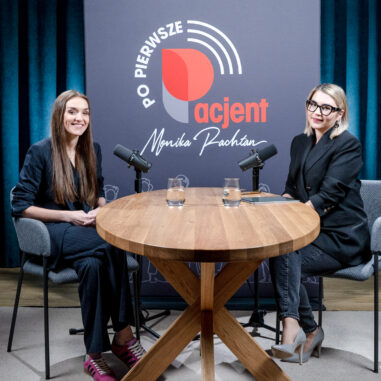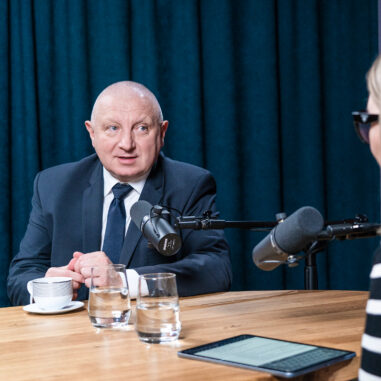
The heart of music, the power to help. Jurek Owsiak and WOŚP. Episode 34
We live in a world where one person can ignite a movement that changes the lives of millions. In the latest episode of First Patient, Monika Rachtan dives into the passionate history of the Great Orchestra of Christmas Charity. Discover how Jurek Owsiak transformed a simple gesture into a global symphony of solidarity and find out how, in the aftermath of the COVID-19 pandemic, WOŚP is fighting for health and hope for everyone.
For more than three decades, under the inspiring leadership of Jurek Owsiak, WOŚP has won hearts and recognition all over the world, being a symbol of solidarity and kindness. Each year brings new challenges and joys, and the history of the Orchestra is like our lives - full of unexpected twists and turns. This year, the GOCC is reverberating in support of those facing lung disease and complications after COVID-19.
32nd GOCC event
For the 32nd Grand Finale of the Great Orchestra of Christmas Charity, scheduled for 28 January, the GOCC is focusing its efforts on supporting pulmonology wards. The aim? The purchase of advanced medical equipment for children and adults, essential for the diagnosis, monitoring and rehabilitation of pulmonary diseases, which have gained in importance after the COVID-19 pandemic. The plans include MRIs and ultrasound scanners, as well as equipment for pulmonary rehabilitation and thoracic surgery. The finale, traditionally with a public collection, will be enriched by online activities and special events.
COVID-19 and the fight against health complications
Despite appearing to be under control, the COVID-19 pandemic continues to pose challenges for health services. Patients often face long-term health consequences that affect their daily lives. It is important to draw attention to these complications and the need to treat them.
Most common complications after COVID-19:
- respiratory problems, including permanent damage to the lungs,
- fatigue and weakness, making normal functioning difficult,
- taste and smell disturbances that may persist for a long time,
- trouble concentrating and remembering, known as 'brain fog',
- increased risk of blood clots and cardiovascular problems.
Early diagnosis and intervention can significantly improve the quality of life of those affected by the consequences of COVID-19. In this context, activities undertaken by institutions such as the Great Orchestra of Christmas Charity take on particular importance.
How was the GOCC established?
The history of the Great Orchestra of Christmas Charity began with a simple gesture by Jurek Owsiak, the host of a radio programme on Radio Three, who, inspired by a conversation with doctors at London's Great Ormond Street Hospital, decided to raise funds for Polish children's hospitals. Owsiak's first actions, although modest, brought in several thousand zlotys, which became the start of a larger mission.
Over time, thanks to the programme that Jurek Owsiak ran, interest in charitable activities grew. A particularly groundbreaking moment came when he decided to organise a collection during the Jarocin festival. Involvement in real charitable activities was a milestone in the development of WOŚP.
A key moment became the first official GOCC Finale, which took place in winter. The choice of this time of year was unusual, but it turned out to be a hit. During the first collection in 1993, 31 billion old zlotys were collected, far exceeding all expectations. Since then, the WOŚP has become one of the most important and recognisable charities, playing a key role in supporting the Polish health service.
Impact of modern technology on the GOCC
Jurek Owsiak, founder of WOŚP, highlights how the internet and modern technology have revolutionised the foundation's activities. In the past, WOŚP relied on traditional fundraising methods such as landlines and street collections. Nowadays, a significant proportion of funds come from electronic sources, demonstrating a huge transformation in the way collections are conducted.
Owsiak notes that while the internet offers unlimited opportunities to reach donors and globalise WOŚP's activities, it also carries risks, such as social media addiction. Nonetheless, for WOŚP, new technologies have become a key tool in the effective running of charitable campaigns. This technological evolution of the foundation shows how digitalisation can serve worthy causes on a large scale.
Despite advances in technology and the development of payment methods, WOŚP remains faithful to traditional fundraising methods. Cardboard tins, a characteristic of GOCC collections, still play an important role. The fact that half of the funds raised come from physical tins is testament to the longevity and validity of traditional fundraising methods, even in the digital age.
Effective equipping of hospitals by the GOCCs
For years, the Great Orchestra of Christmas Charity has been committed to providing modern medical equipment to Polish hospitals. Jurek Owsiak emphasises that the foundation has detailed knowledge of the needs of individual facilities. Its employees contact hundreds of hospitals, both by phone and email, often visiting them in person, which allows them to learn directly about their needs and priorities.
The Foundation focuses on providing medical equipment that is most needed, but also most frequently used in institutions. The GOCC makes a careful selection of equipment, guided by lists sent by hospitals. A group of experts carries out a detailed analysis to ensure that the investments will be effective and bring real benefits to patients.
Owsiak stresses that although hospitals often extend their wish lists, the foundation tries to respond to the most pressing needs. With this approach, WOŚP ensures that the funds raised during their Finals are used in a thoughtful and efficient manner. This methodology maximises the use of donations, ensuring that medical equipment goes where it is needed most and where it can do the most good.
The Patient First programme is available on multiple platforms, including Spotify, Apple Podcasts and Google Podcasts.
Transcription
Monika Rachtan
I am exactly 32 years old, which is the same age as the Great Orchestra of Christmas Charity. Over more than a quarter of a century, I have walked many roads, curves and met many broken trees on my way. But there have also been beautiful sunrises and sunsets. Like all of us, the orchestra has also matured, grown up and changed a lot. But one thing has remained constant - its conductor. The orchestra is us. And our guest today is Jurek Owsiak. A warm welcome to you, Jurek.
Jurek Owsiak
Welcome.
Monika Rachtan
Thank you for accepting the invitation to this programme, because January is a very hectic time for you, when you are very busy. But I would like to ask you about this year's finale of the Great Orchestra of Christmas Charity. You'll be raising money to help people with COVID-19, what are you going to fund with that money? So specifically.
Jurek Owsiak
It is mainly about pulmonology, i.e. the pulmonology departments. Once again, we will be playing for children and adults. This currently involves 15 children's wards and 49 adult wards. We called it 'Lungs after the pandemic' because the pandemic had many effects. Firstly, children's remote learning, where they acquire immunity to various diseases, has been severely affected. Children should come into contact with different diseases in order to develop immunity. Consequently, doctors are informing us of situations that have re-emerged, such as tuberculosis. Even if we are talking about a dozen cases in children, this is already a serious problem. Secondly, adults have had to discontinue their regular treatment related to various lung diseases because wards have been converted into covid wards. The whole situation had the effect of putting many conditions aside, and now they are coming back. Therefore, as always, through various discussions and deliberations, we choose a theme. Everyone can send in their thoughts, and we often draw on the experiences of parents. We give the topic at the end of the year, we don't invent it for the future. We decided that pulmonology is the moment, because a lot of equipment is outdated.
Monika Rachtan
A very important approach.
Jurek Owsiak
The idea is to get it everywhere. People are raising money, so we say we want the unit as close to where you live as possible. If you already go there with problems, the equipment should be on site and of the highest quality. It was the same with paediatric ophthalmology, which we funded three years ago. We replaced a lot of outdated equipment. By doing this kind of research, we found that it is worth investing in diagnostics that pay, treat and rehabilitate.
Monika Rachtan
A comprehensive approach.
Jurek Owsiak
Exactly. We want this to go everywhere. We have already heard from hospitals. We are sending out surveys and now we are waiting to see how much money we can raise and what we can purchase.
Monika Rachtan
I'd like to ask about the equipment, because probably a lot of people are interested in that. You say you do research, i.e. you go around the hospitals, is it all based on surveys.
Jurek Owsiak
At the moment we know all the hospitals, because there are several hundred in Poland. We have contact by phone, e-mail, we visit many hospitals, we know the directors and the people we work with. We open tomography and MRI labs and show what we do. We send out surveys that are carefully specified and the answers are a wish list. We try to select equipment that is needed at multiple sites, we avoid unit purchases. Our group of experts separates repetitive devices from unitary ones. If we abandon a purchase, it is usually because they are difficult to use on just one device. We look for repeatability. Our experts know what goes on in hospitals - how many operations, the number of beds, what patients need. We know what we do very well.
Monika Rachtan
We have said about the fact that the COVID-19 pandemic has meant that we are now measuring ourselves against a very large covid tail, which is all the complications it has left us with. Do you think we could have done something better during the pandemic to make it easier now?
Jurek Owsiak
We could definitely have done better. I would like to add one more source of information for us, which confirms that we are dealing with the right subjects or confirms us in the right choice. Here is the Supreme Audit Office recently revealing that COVID-19 was not adequately addressed or, in other words, the system was poorly prepared. Despite knowledge of the presence of the virus, for example in Italy, the system ignored the situation. The first reactions, as we remember, included the sewing of masks by Poles, although these masks were not effective. As a result, the system, which spent enormous resources on building hospitals where not a single patient was present, and on purchasing 1,200 ventilators, of which we only purchased 87 or 78, showed its arrogance and unpreparedness. As a foundation that operates in the global market, we have good relationships with companies that sell medical equipment and are recognised payers. Large companies always operate through representatives, which is related to warranty issues, service and other aspects. At the time, the current health minister was not aware of these realities.
Monika Rachtan
So we, you and I, were aware, but the minister was not?
Jurek Owsiak
Exactly right. Unfortunately, the system has acted sloppily and arrogantly. We do not pretend to be an institution that knows everything. We would be happy to consult quickly with institutions such as the Ministry of Health, but unfortunately, such cooperation is rare. Usually, we receive wish lists from hospitals, where equipment is mentioned, as well as offers from companies. Our experts try to distinguish between repetitive devices and unique ones. We are now familiar with many of the hospitals and keep in touch by phone and email, as well as visiting them in person. Many decisions are based on thorough surveys. Our focus is on diagnostics that are cost-effective and efficient for treatment and rehabilitation.
Monika Rachtan
Can you talk about the procedure for selecting medical equipment?
Jurek Owsiak
We currently know all the hospitals in Poland, and their number reaches several hundred. All the finals of the Great Orchestra of Christmas Charity have enriched our knowledge of the medical needs of various facilities. We receive very detailed responses from hospitals, often in the form of a wish list. Our group of experts analyse the equipment, trying to select those that are most needed. The value of repetitive devices is lower, so we carefully select those that are unique and necessary. Our activities are based on cooperation with the Ministry of Health and other institutions, but unfortunately, we do not always get answers to specific questions. We are open to proposals and willing to engage in dialogue, but unfortunately, cooperation with institutions is not always smooth.
Monika Rachtan
Are equipment selection procedures based on research and hospital visits?
Jurek Owsiak
Yes, our knowledge of the hospitals comes from numerous visits, both in person and through correspondence. We know the directors and staff with whom we work. We send carefully detailed letters and emails to obtain precise answers. In addition to analysing the equipment, our experts keep track of statistics on the number of operations, available beds, etc. We look at what is happening in these hospitals to better adapt our actions.
Monika Rachtan
We are talking about the current pandemic situation. Do you think that as a society we are ready for another pandemic?
Jurek Owsiak
I fear that we are not ready. Although we have some resources that we use immediately for research, I am afraid we lack full preparedness. Even if we feel that something bad is happening in the GOCC community, we immediately announce research and encourage hygiene so that the disease is not spread further. Last I heard, there was a shortage of vaccines, indicating a problem with ordering enough vaccines. As a result, although we are talking about increasing numbers of sick people, there is a lack of access to doctors and not enough doctors. I am afraid that, despite the preparations we have made, we are not ready for another pandemic. During the election campaign, everyone forgot the urgency of a pandemic and the services should be alert and prepared for all eventualities.
Monika Rachtan
Do you think Poles are aware of the presence of COVID-19 and the continuing threat?
Jurek Owsiak
Even if we have some preparatory measures in place, I fear that many Poles are not aware of the constant threat. We often hear that more and more people are getting ill, but there is a lack of access to doctors. This concern is also due to the lack of information and dialogue on the subject in society. Currently, there is talk of a shortage of vaccines, which shows that we are not sufficiently prepared for possible threats. In spite of the various difficulties, the foundation tries to keep up to date and inform about the existing problems, but I fear that the public is not fully aware of the situation.
Monika Rachtan
You are often identified with the role of GOCC president and conductor, but tell me what you did before founding the orchestra and who really taught you empathy and the desire to help others?
Jurek Owsiak
I have a great love for music and used to play the drums. This passion steered me towards working in the arts, particularly in stained glass. I worked as a stained glass artist and ran my own studio. However, my path to founding the orchestra also involved working as a psychotherapist. I worked at the Synapsis Centre Foundation, which dealt with young people after they had left psychiatric hospitals. Along the way, I also worked as a psychotherapist. My experiences with this influenced my empathy and my desire to help others. In addition to this, I have been involved in student theatres, painting pictures and hosting radio and television programmes. I also worked for a while as a psychotherapist dealing with young people diagnosed with schizophrenia after leaving hospitals. All of these experiences and jobs have influenced who I am today and my involvement with the GOCC. Working as a psychotherapist, I confronted the various challenges of caring for young people after a stay in psychiatric hospitals. It was an extremely intense experience that taught me empathy and understanding for others. It was then that I understood the importance of working for society and the needs of different groups of people. This experience influenced my later charity work and the founding of WOŚP. Of course, the road to that point was long and full of different activities, but working as a psychotherapist was one of the key elements that shaped my approach to helping others.
Jurek Owsiak
And then I say in the Trio that we have such a problem, such children, such equipment breaks down, and they have to replace it. Some million zlotys, I didn't even know how much it was, but you know it's not a small amount. And now what? Suddenly, the phones are ringing, people are coming forward. Am I hearing it right, Mr Jerzy, that there's this hospital and that, but why can't we help it? And a kind of, I would say, snowball effect started, because people started to join in, they started to gather. And then I said to Kuba Wojewódzki and Piotr Klatt that maybe we could do something, maybe we could do a concert, make some money. And they say, OK, we'll do it. And that's how the Great Orchestra of Christmas Charity was born.
Monika Rachtan
How much of that money was raised then?
Jurek Owsiak
That was about fifteen, sixteen years ago or so, so it wasn't yet gigantic amounts, but it was already satisfactory. I remember that we managed to raise several million zlotys, which was a huge success, because at that time there wasn't such awareness yet. And we didn't think of it as an annual event, because that was at the beginning. It was such a charitable, spontaneous action.
Monika Rachtan
But it has evolved into an annual event of great importance in Poland.
Jurek Owsiak
That's exactly right. After that event, when we saw that people wanted to help, that they wanted to get involved, we thought maybe we could do it every year, but in a more organised way. And that's how the Great Orchestra of Christmas Charity was born, which has been running for years now and raises more and more money for various causes every year.
Monika Rachtan
And it all started with this coincidence, this spontaneous idea that turned into a huge charity event. What were people's initial reactions to the initiative?
Jurek Owsiak
Initially there was a lot of scepticism because, as I mentioned, there was a lot of distrust of any non-governmental initiatives in communist Poland. People were used to official collections, and here suddenly something completely new appears. But what happened in Jarocin, at the festival, showed that people were starting to get involved. There was interest because it was something fresh, spontaneous. People started to see that they could actively participate in helping others.
Monika Rachtan
What were the initial objectives for which the money was raised? What was the driving force behind the initiative?
Jurek Owsiak
Initially, the main aim was to support the Children's Health Centre, especially in the purchase of medical equipment. I mentioned the Children's Heart Lung Replacement Device, which was one of the first objectives. Over time, different objectives started to appear, related not only to medicine, but also to education or social welfare. Collections were dedicated to various social needs and problems, and people, seeing the concrete results of their help, began to trust the initiative.
Monika Rachtan
Have you faced any difficulties or resistance from institutions or authorities?
Jurek Owsiak
Of course, there were various difficulties in the beginning. As I mentioned, there was a lot of distrust of NGOs, especially during the communist era. People wondered what the novelty was and whether it could be trusted. There were also cases where some institutions or public figures were reluctant to support the initiative. However, gradually, with each passing year, WOŚP gained trust and acceptance. Today it is a huge social event, but in the beginning various barriers had to be overcome.
Monika Rachtan
How has the public's attitude towards the Great Orchestra of Christmas Charity changed over the years?
Jurek Owsiak
The change was enormous. At the beginning, people looked at it with reserve and even distrust. But year after year, seeing the concrete effects and results of the GOCC's activities, the public began to actively join the initiative. It became a symbol of unity and solidarity. People saw that together you can do a lot of good. Today, the WOŚP is not just a fundraising event, but a huge social event that brings together different groups of people with one goal - to help those in need.
Monika Rachtan
What are the most important lessons you have learned from these 32 years of the Great Orchestra of Christmas Charity?
Jurek Owsiak
The most important lesson is that even the smallest initiative, even a random idea, can turn into something huge that has a positive impact on society. It is also a lesson about the power of solidarity and cooperation. WOŚP has shown that people can unite for the good of others. It is also important that you have to have determination, consistency and trust in people to act for the benefit of others. WOŚP is not only about raising money, but also about social education and building values.
Monika Rachtan
Do you have any dreams or goals you would still like to achieve related to charity work?
Jurek Owsiak
I am certainly always open to new ideas and goals. I would like the WOŚP to continue to grow, helping to improve the situation of many people. At the same time, it is important for charity initiatives to be visible not only in Poland, but also beyond its borders. I would like us as a society to become more and more open to the needs of others and ready to act for the common good. It is a continuous effort to shape social attitudes and develop the idea of helping.
Monika Rachtan
Yes, this is true. It is worth noting that WOŚP has contributed not only to the purchase of medical equipment, but also to the development of social awareness, education and a change in attitudes towards helping those in need. I would like to come back to the question of current forms of fundraising and ask whether you see any challenges or benefits in them?
Jurek Owsiak
Of course, the presence of the internet and modern technology opens up new opportunities, but it also brings with it some challenges. On the one hand, we are able to reach people all over the world and electronic forms of payment enable instant support. On the other hand, there are risks related to data security or online fraud. However, it is necessary to adapt to the changing reality, and we try to do so in a way that maintains people's trust and enables them to actively participate.
Monika Rachtan
Are there any particular moments or projects related to the GOCC that are particularly important or emotional for you?
Jurek Owsiak
There have been many touching moments and projects over the years. Each fundraiser has its own unique character, and every goal that has been achieved is important to me. But certainly the moments when we managed to purchase the first heart-lung, or later the first CT scanner or incubator for premature babies, are particularly emotional for me. These were milestones that showed that we could really change the world and make a difference to the lives of many people.
Monika Rachtan
Is there anything you would like to pass on to younger generations, both in terms of charity and life values?
Jurek Owsiak
I would like to convey to young people that even the smallest gesture of goodwill and willingness to help can have a huge impact. It is worth being open to the needs of others and getting involved in the community. Charity is not just about raising money, but also about consciously taking action to help improve the world. At the same time, let young people believe in the power of solidarity and cooperation - together you can really achieve a lot.
Monika Rachtan
Of course, everyone can see that.
Jurek Owsiak
We have seven million records, and when it comes to births, we are talking about millions of women who have given birth. We are present every day. There have been no logistical scandals. Of course, there are people who may not like me, but that doesn't affect our logistics. Have you ever heard anyone say that we bought the wrong equipment?
Monika Rachtan
This is most important.
Jurek Owsiak
We leave it to people to judge our work.
Monika Rachtan
Jurek, can we talk about you now? What do you like to do in your spare time?
Jurek Owsiak
I have free time. I'm active, that's the most important thing. We have a training centre where we teach teamwork, which we then use at the festival. It's a peace patrol where anyone over 18 can join us. I'm there with them, spending time moving. Besides that, I'm a motivational speaker, companies hire me to speak to their teams. These are cool stories, I'm like a coach, but one hour long. It also makes me work in different places with different people.
Jurek Owsiak
I work here at the foundation and six months later we have a festival, one of the biggest in the world. It's an effort that you regulate yourself. Daily life has an impact. My wife, Dzidzia, works as head of medical affairs, which helps us. Our work is not a family business, my children have their own lives. But I work well, it's a super arrangement.
Monika Rachtan
We associate you with red frames. Where did you get the idea for these glasses?
Jurek Owsiak
Coincidence. I once went to an optician and saw red frames. I put on women's frames and ordered them. Wearing them, I started to accept them. Today, the glasses I have are ours, with our design. We have a new model of glasses for every final. It's important that we started from scratch. The first final and the last final, they differ in technology and technique. It all happens in Poland, we do everything ourselves. Our graphics department creates the design, and all the TV transmission and graphics are our work. All this can be done in Poland. The important thing is that the process of changing Poland has been going in the right direction for a long time.
Jurek Owsiak
We have wasted the last few years, we have stagnated in many places. I am in favour of us being richer, trusting the system. I am willing to pay higher taxes if I know they will be put to good use.
Monika Rachtan
Finally, I would like to ask what you think of the current Polish health service and how you understand the humanisation of medicine?
Jurek Owsiak
The humanisation of medicine requires a national discussion, some kind of upheaval. It requires painful treatment. Someone should tell Poles how things really are, what we are missing, where the problems are. Too often we patch up holes without telling the truth about the state of the health service. Health premiums are high, but do we know where they are going?
Monika Rachtan
Do you know where they are going?
Jurek Owsiak
We visit hospitals and see that many of them look modern and have good equipment, but there is a shortage of staff. We need a forward-looking staffing policy. For example, geriatrics has almost no doctors. The government should be honest, say how much money we have and what we can do. Maybe we need higher taxes, but effective use of these funds.
Jurek Owsiak
Our funds are full of requests for equipment. We see what is needed, for example in the case of sepsis we have invested in modern equipment. What is missing is a policy that clearly defines the needs and capacities of the health service. The Ministry of Health should be more proactive in talking to us. We need to be sure that funding for laboratories and first aid teaching in schools will continue.
Monika Rachtan:
Thank you for meeting us and see you at the GOCC finale.
Previous episodes
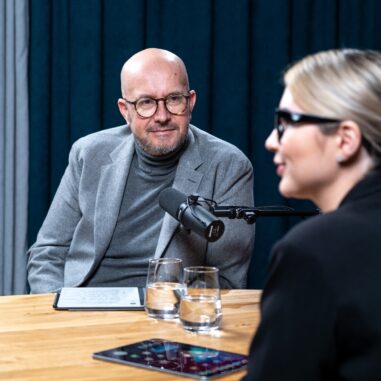
A common language between patient and doctor. Is it possible? Episode 33
Guest of the episode highlights significant challenges in communication between doctors and patients
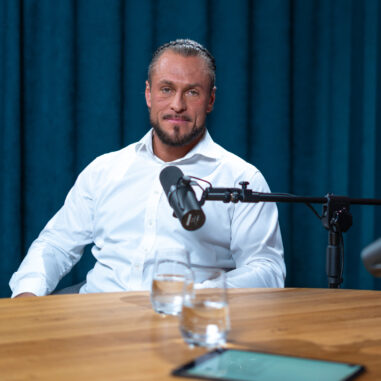
Into the New Year without addictions. What can you do to truly say goodbye to addictions? Episode 32
Emphasising the role of sport in the addiction treatment process is not only a matter of promoting a healthy lifestyle, but also of building awareness of alternative methods of coping with addiction

What next for prescription medicines? New regulations a threat. Episode 31
Introduction of new reimbursement law raises concerns among patients using prescription drugs
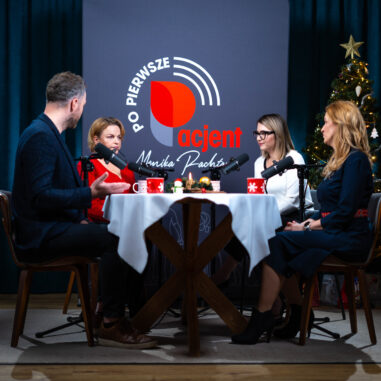
New Year under pressure with resolutions. Episode 30
In Polish Christmas Eve traditions, in addition to the characteristic dishes, there are a number of other customs


